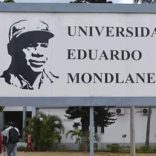Weather Alert: Strong winds forecast for southern Mozambique
Judge says Chang can be extradited to the US – AIM report

File photo: O País
South African judge William Schutte, at the Kempton Park Magistrates’ Court in Johannesburg, on Monday announced that Mozambique’s former finance minister Manuel Chang can indeed be extradited to the United States.
According to the correspondent of the independent daily “O Pais”, Schutte said his decision was based on the evidence that Chang did indeed commit the crimes of which he is accused. These are conspiracy to commit money laundering, wire fraud and securities fraud. Furthermore, the judge added, the request from the United States obeyed all the requirements demanded by South African law for an extradition request.
Neither the South African public prosecutor, nor Chang’s defence team, have objected to the same judge analysing the request from the Mozambican Attorney-General’s Office (PGR) that Chang be extradited to Mozambique.
The Mozambican request includes a document from the PGR which describes the charges against Chang in Mozambique, and says that investigations into the former minister began in 2015. The charges against Chang include corruption, abuse of power and money laundering. Chang is a member of the Mozambican parliament, the Assembly of the Republic and, as such, would normally enjoy immunity from arrest. However, another document from the PGR explains that Chang’s parliamentary immunity has been suspended (by the Supreme Court).
Schutte asked if either side wished to deliver documents relevant to the final decision. Public Prosecutor J.J. du Toit submitted a series of documents with arguments in favour of extraditing Chang to the United States. Chang’s defence attorneys declined to give the judge any documentation, saying they will hand it over directly to the Minister of Justice.
Chang has been in South African police custody since 29 December. He was detained at Johannesburg airport, on the basis of an international arrest warrant issued by the US authorities.
Chang was a key figure in the scandal of Mozambique’s “hidden debts” – the term used to describe the loans of over two billion US dollars which three fraudulent Mozambican companies, Proindicus, Ematum (Mozambique Tuna Company) and MAM (Mozambique Asset Management), obtained in 2013 and 2014 from the banks Credit Suisse and VTB of Russia.
The loans were only possible because the Mozambican government of the time, under President Armando Guebuza, guaranteed them, in violation of the 2013 and 2014 budget laws and of the Mozambican constitution. Chang signed most of the illicit loan guarantees.
The US indictment paints a picture of gross corruption and fraud, involving Mozambican government officials, former executives at Credit Suisse, and the Abu Dhabi based company Privinvest, which was the sole contractor for the three fraudulent companies.
Of the eight people indicted, only one, Privinvest executive Jean Boustani, is currently in detention in New York awaiting trial. Boustani is said to have been deeply involved in around 200 million dollars of bribes and kickbacks channelled via Privinvest. Also indicted, but not yet in custody, is the Privinvest Finance Officer, Najib Allam.
An audit of Proindicus, Ematum amd MAM by the company Kroll Associates, widely regarded as the foremost forensic company in the world, showed that the fishing boats, patrol vessels and other assets provided by Privinvest had been grossly overpriced (by about 700 million dollars).
Three former Credit Suisse executives, Andrew Pearse, Surjan Singh and Detelvina Subeva were arrested in London in early January and are fighting extradition to New York. A decision on the extradition request will not be taken until November.
Two other Mozambicans named in the indictment, Teofilo Nhangumele and Antonio do Rosario, are under arrest in Maputo. Nhangumele is said to have been one of those who was a go-between in the successful attempts to persuade the Guebuza government to approve the first of the fraudulent projects, Proindicus, and took a bribe of 8.5 million dollars from Privinvest.
Rosario became chairperson of all three companies, and refused to collaborate with the Kroll audit, even boasting that he chased the auditors out of his office.













Leave a Reply
Be the First to Comment!
You must be logged in to post a comment.
You must be logged in to post a comment.